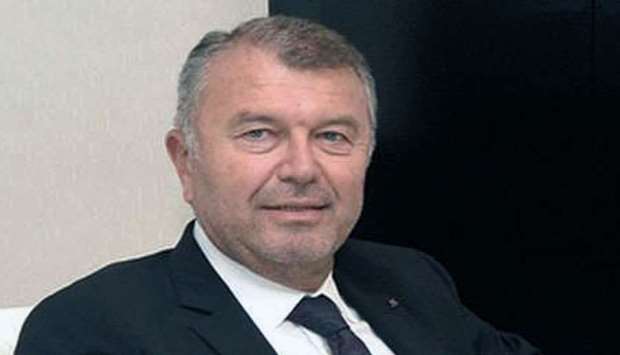By Kabalan Abisaab Former ambassador of Ecuador to Qatar When I got the news of the visit of His Highness the Amir Sheikh Tamim bin Hamad al-Thani to Ecuador this October, my memory carried me to the years when I lived in Doha, as the Ecuadorian ambassador to Qatar, a country that has been put at the forefront of the civilised world due to its wise and visionary leadership. My memory carried me back to the year 2011 when I paid a visit to Doha alongside an official high-level delegation, which I had the honour to organise under the chairmanship of the Ecuadorian minister of foreign affairs, and met His Highness the Father Amir Sheikh Hamad bin Khalifa al-Thani, the Amir of the country at that time.
The visit resulted in the opening of Ecuador’s first embassy in Doha, and also the first in the Gulf region. In fact, the Father Amir’s wisdom was the major stimulus for that sound and wise decision. In the first years following the inauguration of the Ecuador embassy in Doha and the embassy of Qatar in Quito, the capital of Ecuador, in 2012, there was an increase in meetings, signing of agreements (over 10 agreements), project studies and exchange of visits at the highest level, the most significant of which was His Highness the Father Amir’s visit to Ecuador at the head of a high-level delegation and the visit of (former) Ecuadorian President Rafael Correa to Doha, during which he also met with His Highness Sheikh Tamim bin Hamad al-Thani.
Over the years, Qatar has maintained special links with Latin American states in general and Ecuador in particular. The diplomatic presence of several Latin American states in Qatar, and vice-versa, is the greatest testimony to these special bonds and the strenuous and sustained efforts to promote and reinforce them. Also, His Highness the Amir’s visit to Latin American countries confirms the Qatari leadership’s utmost care for solidifying and promoting that relationship. The current visit has important political and economic consequences. In terms of politics, Qatar can shed light on the critical events happening in the Middle East, including the blockade imposed on it by Saudi Arabia, the UAE, Egypt and Bahrain, its motives and consequences. Undoubtedly, listening carefully to the course of events and the Qatari position vis-à-vis this, especially from an important and prominent figure such as His Highness the Amir, will have a credible and influential impact on these states’ position in dealing with the crisis. On the other hand, the visit reflects the direct communication with South American states without any intermediary. This is a deviation from the political tradition and a move towards having direct international relations.
This, no doubt, is significant for the future of these States in terms of international relations. As for economic relations and commercial exchange, whoever follows up on the economic policies of Qatar since 1995 will realise that Qatar has adopted a policy of openness and investment across various fields in many countries, based on a vision to find an alternative to the reliance on oil and gas. In general, the Latin American countries’ distinctive features are their production factors such as natural resources, fertile land, climate, nature, etc, which are the basic elements that Qatar needs and attract capital and investors.
Qatar benefits from having a very prominent element, that is, capital, which the Latin American states lack. So, there are complementary elements and common interests, and co-operation between the two parties may produce fruitful results and benefits for both economies. The most significant element is that this economic relation is based on fundamental principles such as equality, respect for sovereignty, non-interference in the internal affairs of one state by the other.
When I got the news of the visit of His Highness the Amir Sheikh Tamim bin Hamad al-Thani to Ecuador this October, my memory carried me to the years when I lived in Doha, as the Ecuadorian ambassador to Qatar, a country that has been put at the forefront of the civilised world due to its wise and visionary leadership.
My memory carried me back to the year 2011 when I paid a visit to Doha alongside an official high-level delegation, which I had the honour to organise under the chairmanship of the Ecuadorian minister of foreign affairs, and met His Highness the Father Amir Sheikh Hamad bin Khalifa al-Thani, the Amir of the country at that time. The visit resulted in the opening of Ecuador's first embassy in Doha, and also the first in the Gulf region.
In fact, the Father Amir's wisdom was the major stimulus for that sound and wise decision.
In the first years following the inauguration of the Ecuador embassy in Doha and the embassy of Qatar in Quito, the capital of Ecuador, in 2012, there was an increase in meetings, signing of agreements (over 10 agreements), project studies and exchange of visits at the highest level, the most significant of which was His Highness the Father Amir's visit to Ecuador at the head of a high-level delegation and the visit of (former) Ecuadorian President Rafael Correa to Doha, during which he also met with His Highness Sheikh Tamim bin Hamad al-Thani.
Over the years, Qatar has maintained special links with Latin American states in general and Ecuador in particular. The diplomatic presence of several Latin American states in Qatar, and vice-versa, is the greatest testimony to these special bonds and the strenuous and sustained efforts to promote and reinforce them.
Also, His Highness the Amir's visit to Latin American countries confirms the Qatari leadership’s utmost care for solidifying and promoting that relationship.
The current visit has important political and economic consequences.
In terms of politics, Qatar can shed light on the critical events happening in the Middle East, including the blockade imposed on it by Saudi Arabia, the UAE, Egypt and Bahrain, its motives and consequences.
Undoubtedly, listening carefully to the course of events and the Qatari position vis-à-vis this, especially from an important and prominent figure such as His Highness the Amir, will have a credible and influential impact on these states’ position in dealing with the crisis.
On the other hand, the visit reflects the direct communication with South American states without any intermediary. This is a deviation from the political tradition and a move towards having direct international relations. This, no doubt, is significant for the future of these States in terms of international relations.
As for economic relations and commercial exchange, whoever follows up on the economic policies of Qatar since 1995 will realise that Qatar has adopted a policy of openness and investment across various fields in many countries, based on a vision to find an alternative to the reliance on oil and gas.
In general, the Latin American countries' distinctive features are their production factors such as natural resources, fertile land, climate, nature, etc, which are the basic elements that Qatar needs and attract capital and investors. Qatar benefits from having a very prominent element, that is, capital, which the Latin American states lack. So, there are complementary elements and common interests, and co-operation between the two parties may produce fruitful results and benefits for both economies.
The most significant element is that this economic relation is based on fundamental principles such as equality, respect for sovereignty, non-interference in the internal affairs of one state by the other.



